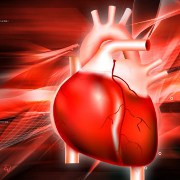 MonkeyBusiness Images/PhotoSpin
MonkeyBusiness Images/PhotoSpin
Most of know the benefits of fiber. It helps to regulate our digestive system, makes us feel a lot better in terms of general health, and has been linked to decreasing our risk of colon cancer.
More good news about a high fiber diet is that it may help in the recovery of those who have had a heart attack.
A group of researchers from Harvard’s School of Public Health wanted to see if fiber could help prolong the lives and good health of those who had suffered a cardiac arrest.
They studied more than 121,000 female nurses and more than 50,000 male health professionals and asked them to fill out questionnaires every two years, indicating their lifestyles and general habits.
Researchers then studied those in the group that had survived heart attacks and asked them to track their fiber intake. More than 2200 of the females in the overall survey had had heart attacks, as had more than 1800 men.
Over the nine years of the survey, 682 of the women and 451 of the men died. The diets of those who had heart attacks were analyzed and split into five groups, depending on the level of their fiber intake.
What was found was that those with high levels of fiber had the best chance of survival (for any reason) in the nine years post-heart attack. They had up to a 25 percent better chance, which is quite significant.
It was seen that 13 percent of the group with the highest fiber intake were also less likely to die from another cardiac condition during this nine-year follow up.
Interestingly, it was high fiber breakfast cereals that caused better chances of survival rather than other sources of fiber. So adopting a high fiber breakfast from cereals can really help a person’s chances of elongating life after a heart attack. This is something we should all know in order to better our chances!
Heart disease is the number one cause of death for women in the United States, even though it used to be considered more of a male disease. This isn't true at all but women do sometimes experience heart attack symptoms that are different to men.
Stomach discomfort and nausea are sometimes symptoms that women seem to get more often than men and consequently pass off as something to do with their digestive systems instead of their hearts.
EmpowHER’s Dr. Daemon Jones took a look in her article Women: What's Your Risk for a Heart Attack? at the symptoms that many women experience.
They include:
• "Chest pain or chest discomfort – for women it might feel more like a squeezing sensation
• "Pain in the neck, back, jaw or arms – it might be gradual or sudden and radiate to the jaw or back, not just focused on the chest and down the left arm
• "Severe abdominal or stomach pain – pain that feels like heartburn, the flu, or a stomach ulcer
• "Nausea
• "Lightheadedness
• "Breaking out in a cold or nervous sweat
• "Extreme tiredness or fatigue"
Women who experience these symptoms, especially more than one, should see a doctor or go to the ER straight away, especially if they have a history of heart disease. It’s better to be safe than sorry.
While even the fittest of us can be susceptible to heart disease, a life plan that includes a healthy (fiber-filled!) diet and plenty of exercise is the best medication-free way to increase your chances for a long and healthy life.
Sources:
Medical News Today. “Increasing fiber intake after a heart attack may prolong survival”. Web. Retrieved April 28th, 2014.
http://www.medicalnewstoday.com/articles/276055.php
Li, Shanshan et al. Dietary fiber intake and mortality among survivors of myocardial infarction: prospective cohort study. BMJ 2014; 348 doi:
http://dx.doi.org/10.1136/bmj.g2659 (Published 29 April 2014) http://www.bmj.com/content/348/bmj.g2659
EmpowHER.com. Heart Conditions. Heart Disease. “Women: What’s Your Risk For a Heart Attack?” Web. Retrieved April 28th, 2014.
https://www.empowher.com/heart-disease/content/women-whats-your-risk-hea...
Reviewed April 30, 2014
by Michele Blacksberg RN





Add a CommentComments
There are no comments yet. Be the first one and get the conversation started!